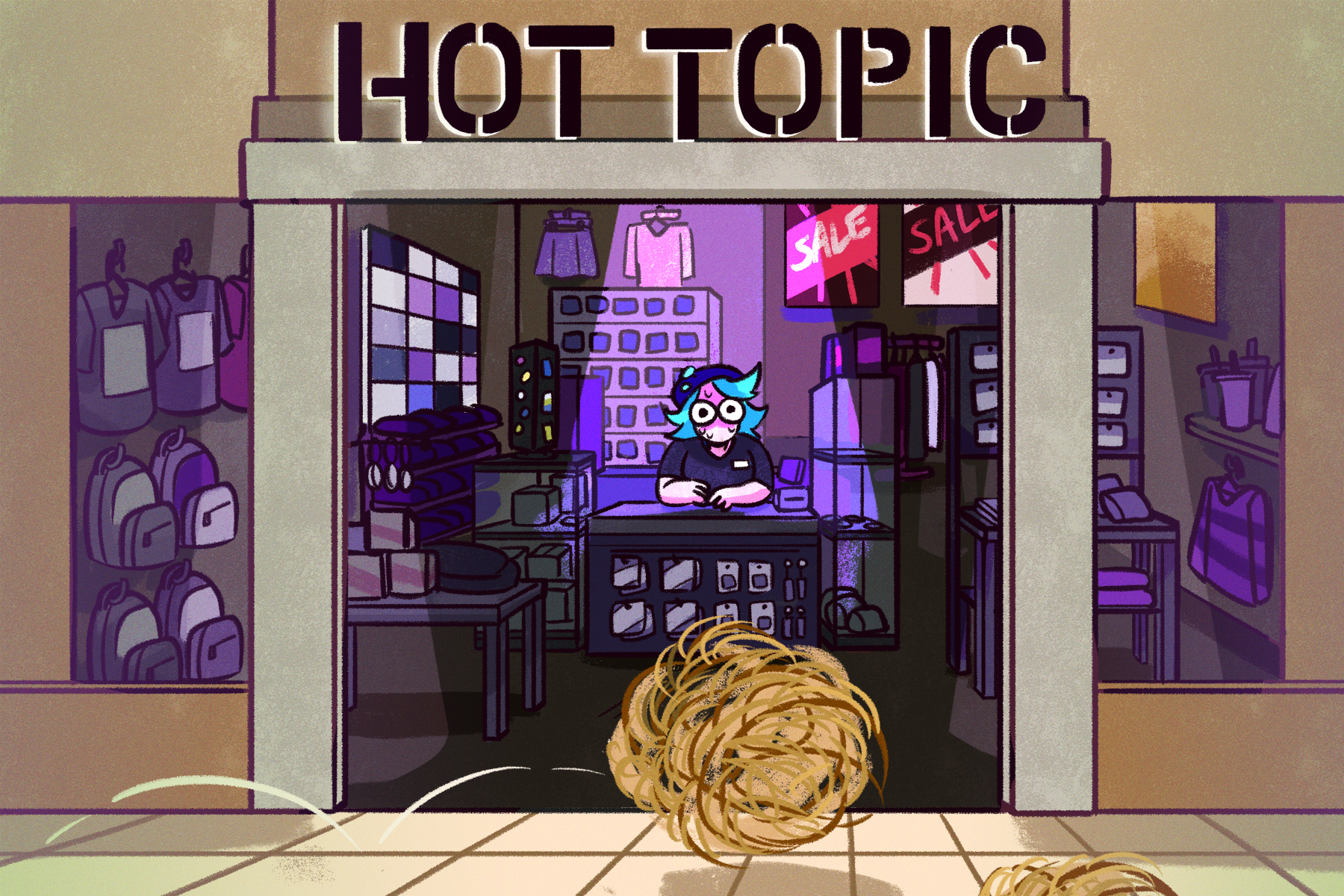Before the founding of Hot Topic in 1989, no mainstream franchise dared to affiliate itself with the controversial realm of early alternative culture and all its equally concerning fringe communities. Fresh off the 1980s “Satanic Panic,” American society’s tolerance for groups that threatened the country’s ever fragile Reagan-era values hit an all-time low and anyone or anything found operating outside of that norm automatically gained a rebellious reputation.
Hot Topic soon rose into mainstream alternative prevalence in mid-1996 at the genesis of the nu-metal movement and continued to climb the alt style ladder until the franchise reached a fever pitch at the start of post-2000s scene kid culture. But how did a franchise with seemingly no commercial competitors within the same niche manage to fall so far from grace?
‘80s Satanic Panic, MTV and the Birth of Hot Topic
Eight years before the conception of Hot Topic, a new TV channel centered around music emerged as the first of its kind, and like the clothing franchise, existed competition-free. MTV, or Music Television, broadcasted music videos 24 hours a day and as the channel branched out in 1985 with new blocks reserved for specific music genres, it established the need for a perpetual market previously accessible only through concert merch tables or fan-made merchandise comprised of T-shirts, patches, stickers and pins — and within this market, the founders of Hot Topic discovered a profitable niche. In a 1997 interview with Chain Store Age, founder Orv Madden explained the reasoning behind Hot Topic’s creation, stating that he “saw an underserved market — music-related T-shirts and apparel — that traditional, mall-based retailers were ignoring, and I decided to pursue it.”
Despite Hot Topic’s alleged pandering toward what the alt community calls “normies” that occasionally earns the company scorn, stores that catered to the alternative style were few and far between and so Hot Topic remained a haven for those without the luxury of living near alternative hot spots. And for those with a penchant for rebelling against their parents still reeling from the Satanic Panic, teenagers of the late ’80s and ’90s seized their opportunity to stick it to the man — and what better way to scare mom and dad than by turning up the metal music and dressing in all black?
Popular Among the Unpopular
In the ‘90s and early 2000s, alternative culture pivoted from a metal and goth aesthetic to the emerging pop-punk and emo culture when bands like My Chemical Romance, Fall Out Boy and Panic! At The Disco gained popularity. However, what made this new era of Hot Topic unique is that these three bands didn’t gain traction entirely on their own but received exposure as a result of having their merchandise sold at the store. By this point, Hot Topic became the spot for a person to not only buy their favorite band’s merch but a place where they could discover new artists. With the help of employee recommendations (Hot Topic borderline pays for their employees to attend concerts in exchange for a “fashion report”) and overhead TVs blasting the newest punk songs, Hot Topic allowed customers to stay in the alternative loop.
Besides a persistent lack of retail competition, Hot Topic’s early success can be boiled down to two factors: the company’s willingness to hear out its customers and its ability to roll with the changes in alternative fashion. One example of this is the clipboard that hangs next to the band T-shirt display in probably every Hot Topic, where customers can write in the musicians whose merch they want to see in stores.
But as Hot Topic focused its sights on geek culture, several online stores such as BlackCraft Cult, Killstar and the infamous Dolls Kill picked up where the franchise left off with goth/emo fashion.
The Downward Spiral
But like all good things, nothing lasts forever and as the years passed, it became increasingly evident that Hot Topic lost the original vision that made it so successful in the first place. With internet culture’s tightening grip on the mainstream, the new genre of “geek culture” found a place in alternative circles and like any reasonable franchise, Hot Topic followed suit. However, this time the franchise would finally face retail competition in the form of GameStop.
Formerly known as FuncoLand, after some rebranding the video game retailer became GameStop, which sold everything from gaming consoles to collectables to gaming accessories to, well, video games. Alongside GameStop stood its sister company, ThinkGeek, which focused more on video game merchandise — and is basically the gaming equivalent to Hot Topic. Although Hot Topic did attempt to acquire the website ThinkGeek through a $122 million bid in June 2015, GameStop bought out the franchise by an extra $18 million and opened its first physical store in September that same year.
For the first time, Hot Topic faced genuine competition and although the franchise found their footing as geek culture rose to prominence by opening their own novelty geek store, BoxLunch, Hot Topic still faltered under the pressure.
While Hot Topic remains the primary source for all band tees, the company reserves most of its stock for pop culture merch that revolves around popular TV shows, anime and movies, even though BoxLunch sells the exact same products.
Hot Topic’s stagnation is most evident in the process by which new merchandise is released as well as its declining quality. One instance of this could be seen during the launch of the franchise’s Pride 2021 collection; by taking one look at Hot Topic’s online store at the time, one could immediately notice the minimal variation between each shirt design, which could easily be recreated with transfer paper, a colored printer and a pack of plain black T-shirts. Not to mention the increase in store prices — long gone are the years of accessible alternative clothing, a change that’s pulled the alt community into thrift culture, but that’s another story.
Over the past few years, customers expressed their wish for Hot Topic to return to its roots, even creating a petition, but so far, the franchise, which is under new management, will remain as a pop culture store for the time being.


















Gracias, estaba pensando en cómo fueron los inicios de Hot Topic,no lo pudo explicar mejor ❤️🩹